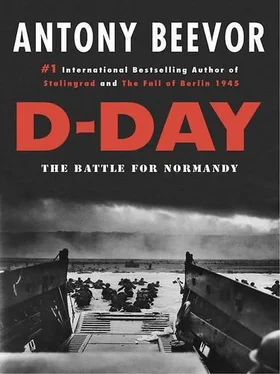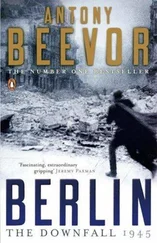The Prime Minister’s obsessive desire to be close to the centre of action had prompted him to insist that he sail with the invasion fleet. He wanted to watch the bombardment of the coast from the bridge of the cruiser HMS Belfast . He did not warn Brooke, knowing that he would disapprove, and tried to justify his demand on the grounds that he was also Minister of Defence. Fortunately the King dealt with this in a masterly letter on 2 June: ‘My dear Winston, I want to make one more appeal to you not to go to sea on D-Day. Please consider my own position. I am a younger man than you, I am a sailor, and as King I am the head of all the services. There is nothing I would like better than to go to sea but I have agreed to stay at home; is it fair that you should then do exactly what I should have liked to do myself?’
Churchill, in a ‘peevish’ frame of mind at being thwarted, ordered up his personal train as a mobile headquarters to be close to Eisenhower. Brooke wrote in his diary, ‘Winston meanwhile has taken his train and is touring the Portsmouth area making a thorough pest of himself!’ There was one bright moment on that eve of D-Day. News arrived that Allied forces under General Mark Clark were entering Rome. But Churchill’s attention was about to be taxed with an almost insoluble problem. General Charles de Gaulle, the leader of the Free French, who used the Cross of Lorraine as his symbol, had arrived in London that morning. Pre-D-Day jitters, combined with political complications and de Gaulle’s patriotic egocentricity, were to lead to an explosive row.
The central problem of relations with de Gaulle stemmed from President Roosevelt’s distrust. Roosevelt saw him as a potential dictator. This view had been encouraged by Admiral Leahy, formerly his ambassador to Marshal Pétain in Vichy, as well as several influential Frenchmen in Washington, including Jean Monnet, later seen as the founding father of European unity.
Roosevelt had become so repelled by French politics that in February he suggested changing the plans for the post-war Allied occupation zones in Germany. He wanted the United States to take the northern half of the country, so that it could be resupplied through Hamburg, rather than through France. ‘As I understand it,’ Churchill wrote in reply, ‘your proposal arises from an aversion to undertaking police work in France and a fear that this might involve the stationing of US Forces in France over a long period.’
Roosevelt, and to a lesser extent Churchill, refused to recognize the problems of what de Gaulle himself described as ‘an insurrectional government’. De Gaulle was not merely trying to assure his own position. He needed to keep the rival factions together to save France from chaos after the liberation, perhaps even civil war. But the lofty and awkward de Gaulle, often to the despair of his own supporters, seemed almost to take a perverse pleasure in biting the American and British hands which fed him. De Gaulle had a totally Franco-centric view of everything. This included a supreme disdain for inconvenient facts, especially anything which might undermine the glory of France. Only de Gaulle could have written a history of the French army and manage to make no mention of the Battle of Waterloo.
Throughout the spring, Churchill had done his best to soften Roosevelt’s attitude, knowing that the Allies had to work with de Gaulle. He encouraged Roosevelt to meet him. ‘You might do him a great deal of good by paternal treatment,’ he wrote, ‘and indeed I think it would be a help from every point of view.’
Roosevelt agreed to see him, but he insisted that de Gaulle must request the meeting. To issue an official invitation would imply recognition of de Gaulle as France’s leader. The President stuck to his line that the Allied armies were not invading France to put de Gaulle in power. ‘I am unable at this time,’ he wrote, ‘to recognise any Government of France until the French people have an opportunity for a free choice of Government.’ But since elections could not possibly be held for sometime, this would mean that the administration of liberated areas would be carried out by AMGOT, the Allied Military Government of Occupied Territories.
This acronym represented a deadly insult, both to de Gaulle and to the Comité Français de Libération Nationale in Algiers. On 3 June, the day before de Gaulle flew to Britain, the CFLN declared itself to be the Gouvernement Provisoire de la République Française. This announcemen twas immediately seen by Roosevelt as a deliberate provocation. He had already forbidden Eisenhower to have any contact with the French administration in waiting.
Eisenhower was permitted to work only with General Pierre Koenig, whom de Gaulle had appointed as commander of the Resistance, known as the Forces Françaises de l’Intérieur, or the FFI. Yet even then Eisenhower was told not to trust Koenig with details of the invasion, because he would be obliged to report back on them to his political masters. These contradictions resulted in ‘acute embarrassment’, as Eisenhower admitted in a report to Washington. ‘General Koenig feels very keenly the fact that he is denied even the most general knowledge of forthcoming operations although French naval, air and airborne units are to be employed, and much is expected from [the] French resistance.’
Churchill had meanwhile been urging Roosevelt to accept ‘a working arrangement’ with the French Committee, principally because the Allies needed the Resistance to play its part in the invasion. He had also helped persuade the Americans to send to England the French 2nd Armoured Division (known as the 2ème DB for Division Blindée), which they had armed and equipped in North Africa. Commanded by General Philippe Leclerc, it would form part of Patton’s Third Army later in the Normandy campaign. Yet to the amused resignation of British officers, one of the first ceremonies which Leclerc’s Division organized after its arrival in Yorkshire was an official mass in honour of Joan of Arc, whom the English had burned at the stake some five hundred years earlier.
Allied troops, on the other hand, were warned not to offend French sensibilities after they landed. A pamphlet told them to avoid any reference to France’s humiliating defeat in 1940. ‘Thanks to jokes about “Gay Paree” etc.,’ it added, ‘there is a fairly widespread belief that the French are a gay, frivolous people with no morals and few convictions. This is especially not true at the present time.’ But official briefings were unlikely to have much effect on those gripped by excited speculation over ‘French mademoiselles’.
Churchill’s War Cabinet realized that the Free French leader had to be invited to Britain to be briefed on D-Day. Despite ‘all the faults and follies of de Gaulle,’ the Prime Minister wrote to Roosevelt, ‘he has lately shown some signs of wishing to work with us, and after all it is very difficult to cut the French out of the liberation of France.’ The President, however, had insisted that in ‘the interest of security’ de Gaulle must be kept in the United Kingdom ‘until the Overlord landing has been made’.
The weakness of Free French security stemmed not from Vichy spies infiltrating the Gaullist network but from the unsophisticated French codes. Exasperation within the Special Operations Executive, especially after the massive Gestapo infiltration of the Resistance the year before, prompted the chief SOE cryptographer, Leo Marks, to go round to the Gaullists’ office in Duke Street in central London. He asked their cipher officers to encode any message they wanted, then he took it from them and broke it ‘under their astonished noses’. ‘This did not endear the British to the French,’ wrote the official historian with dry understatement. Yet Gallic pride still prevented the Free French from using British or American code systems. Just before D-Day, ‘C’, the head of the Secret Intelligence Service, warned the Prime Minister that the French must not be allowed to send any messages by radio, only by secure landlines.
Читать дальше











